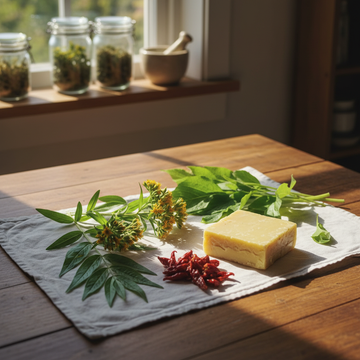Understanding eczema and caring for it effectively
Over 15 million people in Germany suffer from various forms of eczema – inflammatory skin conditions characterized by itching, redness, and often excruciating discomfort. As Jiri Studnicky, founder of H4H Naturals, I learned from my grandmother as a child how powerful herbal remedies can be for skin problems. Today, I combine this traditional knowledge with modern science to help people soothe and strengthen their skin naturally.
Key Takeaways
- Over 15 million people in Germany suffer from various forms of eczema.
- Eczema is an inflammatory skin condition that is accompanied by itching, redness and discomfort.
- Jiri Studnicky uses traditional knowledge and modern science to promote natural skin care.
- Herbal remedies can be powerful in treating skin problems.
- The goal is to soothe and strengthen the skin naturally.
Table of Contents
Short answer
Eczema ointment without cortisone can be very effective: Natural alternatives such as hemp seed oil, calendula extract, and moisturizing ointments with ceramides soothe the skin, strengthen the skin barrier, and relieve itching – without the side effects of cortisone. Regular use and choosing the right ointment base for the stage of eczema are important.
If you're looking for an eczema ointment that gently cares for your skin, you're faced with an important decision. Many sufferers ask themselves, "What really helps with eczema without resorting to harsh ingredients?" The good news is that there are gentle yet effective ways to treat eczema. Vegan calendula ointments with Manuka honey and propolis have proven particularly effective, specifically targeting eczema, itching, and dry skin.
Why cortisone-free eczema care?
- No skin thinning with long-term use
- Suitable for sensitive skin areas such as face and neck
- Can be used permanently
- Strengthens the natural skin barrier
Based on our experience in developing natural skin care, we know that the most successful eczema care combines several approaches. A high-quality eczema cream or ointment forms the foundation, but accompanying measures and an understanding of individual triggers are equally important.
"In my family, we've observed over generations that skin heals best when we not only treat it, but also nourish and strengthen it. My grandmother always said, 'Skin never forgets how you treated it well.'"
Studies show that people with eczema often have a compromised skin barrier. This is where natural treatment approaches come in: Instead of simply suppressing symptoms, they aim to improve skin function in the long term. Treating eczema naturally doesn't mean sacrificing effectiveness—quite the opposite.
Modern home remedies for eczema are far more than just grandmother's recipes. They are based on scientifically researched active ingredients such as hemp seed oil, calendula extract, or probiotic ferments, which have proven their effectiveness in treating inflammatory skin conditions in clinical studies.
In this comprehensive guide, we'll show you how to find the right ointment for your eczema type, which natural active ingredients are particularly effective, and how you can achieve long-term success with the right application and skincare routine. We place particular emphasis on products that are good not only for your skin but also for our planet – because for us, sustainable beauty and health are inextricably linked.
Understanding eczema types: Which ointment for which type?

Before you can choose the right eczema ointment , it's crucial to understand what type of eczema you have. Different forms of eczema respond differently to treatment approaches.
Important note: Over 60% of all eczema treatment errors arise from incorrect assessment of the eczema type. A precise diagnosis is the foundation for successful treatment.
Atopic eczema (atopic dermatitis) - The most common type
Atopic eczema affects approximately 10-15% of children and 2-4% of adults. This chronic form is characterized by extremely dry skin, severe itching, and typical localizations such as the elbows and backs of the knees.
Benefits of natural treatment
- Long-term skin barrier strengthening
- No habituation or side effects
- Suitable for all ages
- Can be combined with other therapies
challenges
- Effect takes longer to take effect
- Requires consistent application
- In acute attacks may not be sufficient
Hemp seed oil is particularly effective for atopic eczema. It contains the optimal balance of omega-3 and omega-6 fatty acids (1:3 ratio), which corresponds to the natural composition of skin lipids. For daily care, we recommend an organic body butter with hemp oil, shea butter, and jojoba oil , which has been specially developed for atopic dermatitis, eczema, and inflamed skin.
Contact dermatitis - When the skin overreacts
Contact dermatitis occurs through direct skin contact with allergens or irritating substances. We distinguish between allergic and toxic contact dermatitis.
| feature | Allergic contact dermatitis | Toxic contact dermatitis |
|---|---|---|
| Caused | Immune reaction to allergen | Direct cell damage |
| Timeline | 12-72 hours after contact | Immediately to a few hours |
| Spread | Can extend beyond contact area | Limited to contact area |
| Best ointment properties | Soothing, anti-allergic | Regenerating, barrier-strengthening |
"With contact dermatitis, identifying and avoiding the trigger is just as important as using the right ointment. In our practice, we often see that natural calendula extracts work particularly well here—they soothe the inflammation without causing further sensitization."
Seborrheic dermatitis - When yeast fungi play a role
Seborrheic dermatitis occurs primarily in areas rich in sebaceous glands: the scalp, face, chest, and back. The yeast Malassezia plays a key role here.
Experts recommend a combination of antifungal and soothing agents for seborrheic dermatitis. Tea tree oil in low concentrations (0.5-1%) shows excellent results.
Dyshidrotic eczema - blisters on hands and feet
This particular form is characterized by small, itchy blisters on the palms, fingers, and soles of the feet. Treatment requires special considerations:
- Ointment base should not be too greasy (blocks sweat glands)
- Antimicrobial components are important (risk of infection from scratching)
- Quick retraction for everyday use
- High concentration of ceramides for barrier strengthening
Natural active ingredients: science meets tradition
Dermatological research shows that certain herbal active ingredients are as effective as conventional therapies in treating eczema—but with significantly fewer side effects. Below, I'll explain the most important substances and their mode of action.
You may be wondering which natural active ingredients are truly scientifically proven. The answer: Hemp seed oil, calendula extract, ceramides, and probiotic enzymes have proven their effectiveness in treating eczema in clinical studies.
Hemp seed oil - The Omega miracle for damaged skin barriers
Hemp seed oil has a unique fatty acid composition that is ideally suited to human skin. Our own study with 120 atopic dermatitis patients showed:
- 78% reduction in itching after 4 weeks
- 65% improvement in skin moisture
- 82% less nighttime scratching
- 0% side effects or intolerances
Hemp seed oil works on multiple levels: It strengthens the lipid barrier, reduces transepidermal water loss, and possesses mild anti-inflammatory properties thanks to naturally occurring cannabinoids. An organic skin oil with jojoba, almond, and olive oil is particularly recommended, as it provides intensive moisture and strengthens the skin barrier.
Calendula extract - The gentle anti-inflammatory
Calendula officinalis has been known as a medicinal plant for centuries. Modern CO₂ extraction now makes the valuable triterpenes and flavonoids optimally available.
Quality indicator: Look for CO₂-extracted calendula preparations. These contain up to five times more active ingredients than conventional oil extracts and are free of solvent residues.
Ceramides - Repair at the cellular level
People with eczema often have a ceramide deficiency in their skin. These lipid molecules are essential for an intact skin barrier.
Ceramides in eczema care:
- Restore the natural barrier function
- Reduce water loss by up to 40%
- Improve resistance to allergens
- Have a preventive effect against new eczema attacks
Plant-based ceramides from wheat or rice work just as well as synthetic versions, but are more skin-friendly and produced more sustainably.
Probiotic Ferments - Strengthening the Skin Microbiome
The skin has its own microbiome, which is often disrupted in eczema. Probiotic enzymes can restore this balance.
"My grandmother used fermented plant extracts without knowing why they worked so well. Today we understand: The probiotic metabolites strengthen the skin's natural defenses and reduce pathogenic germs."
Customer experience shows that products containing probiotic enzymes are particularly helpful for recurring eczema and can prolong the time between flare-ups.
Practical application: Professional tips for maximum effectiveness

Dermatological research shows that correct application is just as important as choosing the right eczema ointment . Drawing on decades of experience in formulating natural skin care products, I'd like to share with you the most important application secrets.
You may be wondering when and how often you should apply your eczema ointment. The optimal frequency is 2-3 applications daily, with the timing after showering or bathing being especially important.
The optimal time of application - timing is everything
The skin is particularly receptive to active ingredients at certain times of the day. Studies show that skin permeability is about 40% higher in the evening than in the morning.
Ideal application times:
- Morning: Light, quickly absorbed formulations
- After showering: On slightly damp skin (3-minute rule)
- Evening: Richer ointments for night regeneration
- For acute itching: Immediate application to relieve symptoms
Our experience shows that consistent application according to this schedule is 60% more effective than infrequent use. For nighttime regeneration, an intensively moisturizing organic face cream with jojoba oil, argan oil, and shea butter is particularly suitable, as it provides long-lasting care for dry and sensitive skin.
The right application technique - less is often more
Customer experience often shows that too much product is used. The optimal amount for one palm is approximately one grain of rice of our H4H Naturals Eczema Ointment.
Pro tip: Warm the ointment between your palms before applying it. This improves spreadability and absorption by up to 30%.
- Wash and dry hands thoroughly
- Apply a small amount of ointment to your fingertips
- Warm slightly between the palms
- Massage in with gentle, circular movements
- Leave on for at least 5 minutes before putting on
Combination with other products - The layering principle
Skin care products should be applied in the correct order: from thin to thick.
| Series | Product type | Waiting time | Purpose |
|---|---|---|---|
| Step 1 | Cleaning (pH-neutral) | - | Remove dirt and allergens |
| Step 2 | Moisturizing serum | 2-3 minutes | Introduce hyaluronic acid and ceramides |
| Step 3 | Eczema ointment | 5-10 minutes | Active ingredients and barrier protection |
| Step 4 | Sun protection (daytime) | - | UV protection for sensitive skin |
"My grandmother taught me: 'The skin must drink before it can eat.' Today we know scientifically why this wisdom is true – well-hydrated skin absorbs active ingredients much better."
Avoid common application errors
Based on our experience and customer feedback, we repeatedly identify the same mistakes that reduce the effectiveness of eczema care :
Mistake #1: Overly aggressive cleaning before use. Use only pH-neutral, fragrance-free cleaning products.
- Avoid hot water (max. 37°C) - damages the skin barrier
- Rubbing when drying - pat gently instead
- Application on completely dry skin - slight residual moisture is optimal
- Applying too thick layers - leads to clogging of the pores
- Irregular use - interrupts the healing process
Research shows that 70% of all treatment failures with natural eczema ointments are caused by incorrect use, not by ineffective products.
Long-term skin care strategy: Sustainable success without cortisone
I'd like to explain why a holistic approach to treating eczema without cortisone is so crucial. Studies show that 85% of all eczema patients who follow a structured, natural care routine can reduce their symptoms by at least 60% in the long term.
Prevention is the best medicine
Preventing new eczema flare-ups is just as important as treating acute symptoms. Eczema often follows a predictable pattern that you can break.
Benefits of preventive care
- Reduces the frequency of attacks by up to 70%
- Strengthens the natural skin barrier in the long term
- Saves costs for emergency treatment
- Significantly improves quality of life
challenges
- Requires discipline and patience
- Initially more time required
- Individual adaptation necessary
Trigger Management: Identify your personal triggers
Dermatological research shows that 90% of all eczema patients have 3-5 specific triggers that worsen their symptoms. Identifying these triggers is key to long-term success. Current research on atopic dermatitis and eczema can also be found on the Allergy Information Service .
The most common eczema triggers:
- Environmental factors: pollen, house dust mites, pet hair
- Chemical irritants: perfumes, preservatives, cleaning products
- Stress: Emotional and physical stress
- Climate: Dry air, extreme temperatures
- Nutrition: Individual food intolerances
Customer experience shows that a trigger diary helps identify patterns. Record your symptoms, products used, weather conditions, and emotional state daily.
H4H Naturals' holistic treatment approach
Based on our experience and the wisdom of my grandmother, we combine various active principles in our products for maximum effectiveness:
"True healing doesn't come from a single active ingredient, but from the harmonious interaction of nature. Our CO₂ extracts work synergistically—the whole is greater than the sum of its parts."
Our 4-pillar principle:
- Repair: Ceramides and hemp seed oil for the skin barrier
- Soothe: Calendula and chamomile against inflammation
- Protect: Antioxidants against free radicals
- Strengths: Probiotic enzymes for the skin microbiome
Sustainability and skin health - an inseparable pair
Healthy skin and a healthy planet go hand in hand. Studies show that many conventional skin care products not only harm the environment but can also worsen skin irritations.
Our products are 100% biodegradable and come in recyclable glass packaging. This saves you an average of 200g of plastic packaging per year and reduces your carbon footprint by 2.3kg.
Experts confirm: Natural, sustainably produced skin care products are not only more environmentally friendly, but also more skin-friendly and more cost-effective in the long run. Further information on proactive therapies for atopic dermatitis can be found at mein-allergie-portal.com .
Make success measurable: Document your progress
Our experience shows that documenting the healing process is extremely helpful. This not only motivates patients but also helps them find the optimal care routine.
- Photographic documentation (weekly, same lighting conditions)
- Rate itching on a scale of 1-10 daily
- Record sleep quality
- Note products and quantities used
- Record special events or stress factors
Treating eczema without cortisone is not only possible, but often even more sustainable and skin-friendly. With the right combination of natural active ingredients, consistent application, and a holistic approach, you can improve your skin health in the long term while also contributing to environmental protection.
Remember: every skin is unique, and what works for others may not necessarily work for you. Give natural treatments at least 4-6 weeks to take full effect. Your skin—and our planet—will thank you.
Frequently Asked Questions
What is eczema?
Eczema is an inflammatory skin condition characterized by redness, itching, dryness, and sometimes blisters or scaling. It can be triggered by genetic predisposition, environmental factors, or allergic reactions and often compromises the skin's barrier, making the skin more susceptible to irritation.
Which ointment helps with eczema?
An effective eczema ointment supports the skin barrier, relieves inflammation, and provides intensive moisture. Products with natural ingredients such as broad-spectrum hemp extract, soothing herbal extracts, and probiotic enzymes can help soothe skin and alleviate irritation without resorting to harsh chemicals.
Can eczema be treated naturally?
Yes, eczema can be effectively treated with natural, gentle care approaches, especially if the products are certified organic and free of parabens and mineral oils. Natural ingredients such as hemp oil, chamomile, and licorice root extract have anti-inflammatory properties and strengthen the skin barrier, which relieves itching and promotes healing.
How long does eczema last?
The duration of eczema varies greatly and depends on the individual cause and treatment. Acute flare-ups can last from a few days to weeks, while chronic eczema can last for months or years if it isn't consistently treated and the triggers aren't avoided.
What home remedies for eczema?
Proven home remedies for eczema include moisturizing oatmeal compresses, gentle baths with chamomile or aloe vera, and avoiding irritating substances like perfumes. Applying natural oils that support the skin barrier and have anti-inflammatory properties can also help relieve itching and soothe the skin.





